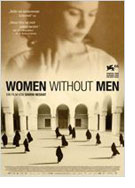

Opening 1 Jul 2010
Directed by:
Shirin Neshat
Writing credits:
Shoja Azari, Steven Henry Madoff, Shirin Neshat, Shahrnoush Parsipour
Principal actors:
Arita Shahrzad, Navid Akhavan, Mina Azarian, Tahmoures Tehrani, Pegah Ferydoni
Five women, unknown to each other, live in modern-day Iran. Faced with various problems all due to men, fate brings them together in an isolated country house surrounded by beautiful natural fauna. Fakhri (Arita Shahrzad) has had enough of her husband who, after years of marriage, seems not to realize that she is a smart and thinking woman with opinions. Luckily, she is financially secure and can move away from him to find peace in the countryside. This peace is interrupted when the prostitute Zarin collapses nearby. With tender care she slowly recovers from her inhuman, abhorrent life in the brothel. Another girl jumps to her death when she learns of her brother’s plans to marry her off. Still, her best friend is in love with the brother, but he chooses another. Another girl becomes involved in political demonstrations on the streets of Teheran. These girls also end up in the countryside with Fakhri (one of them as the ghost she now is). The film ends with Fakhri hosting a huge party for both men and women guests in her country house. They are curious about her decision to live alone. It ends on a political note with soldiers entering the house. My impression was that this paradise was short lived, i.e., faces imminent curtailment.
Based on the book by Sharush Parsipur, this is a first film by Shirin Neshat, who then won first prize for best director at the 2009 Venice film festival. Her film also showed at the Sundance and the Toronto film festivals. The colors and photography are beautiful. The plot is difficult to follow. One must take into consideration the Iranians’ love of tradition, prose and poetry, which is reflected in the story. Also, the revolution pictured is not contemporary, but also historical. This would be an interesting film to watch with Iranian friends who may be able to clear up some of the background; a native Iranian would certainly understand the references and innuendo – from the feminist, literary, and political aspects.
It will be interesting to watch the career of director Neshat, an Iranian woman who left Iran shortly before the Shah was overthrown the end of the 1970s. She has since lived in the U.S. and her films are not shown in Iran. Also, one of her actresses, Pegah Ferydoni, is interesting in that in 1985 she left Iran at the age of two with her parents. She grew up in Berlin and is now enjoying an interesting, successful career in Germany, which started with her role in a German TV series called Turkisch für Anfänger. (Becky Tan)